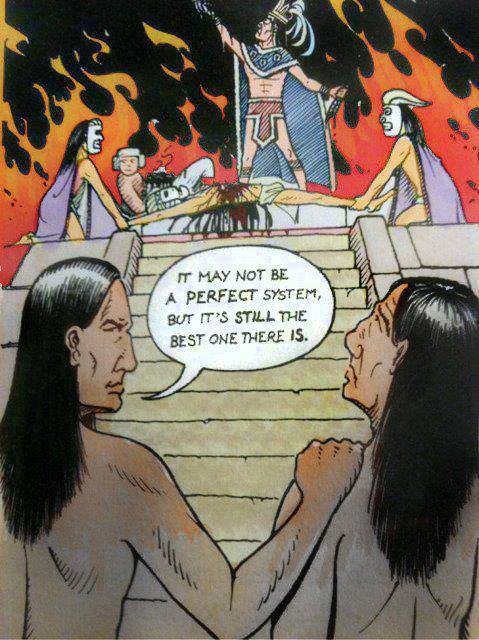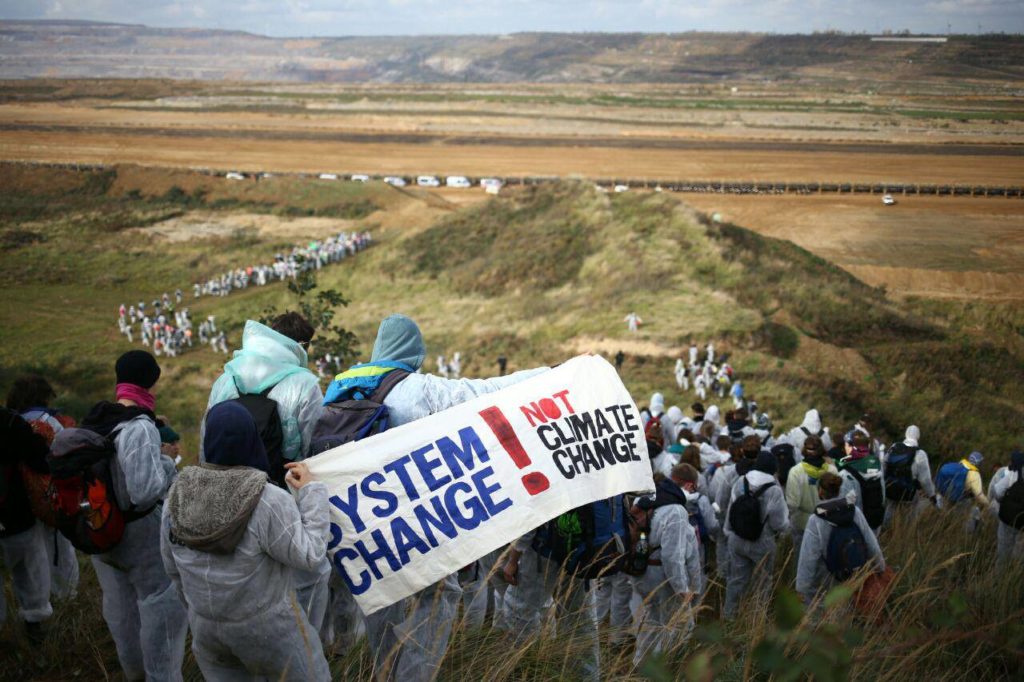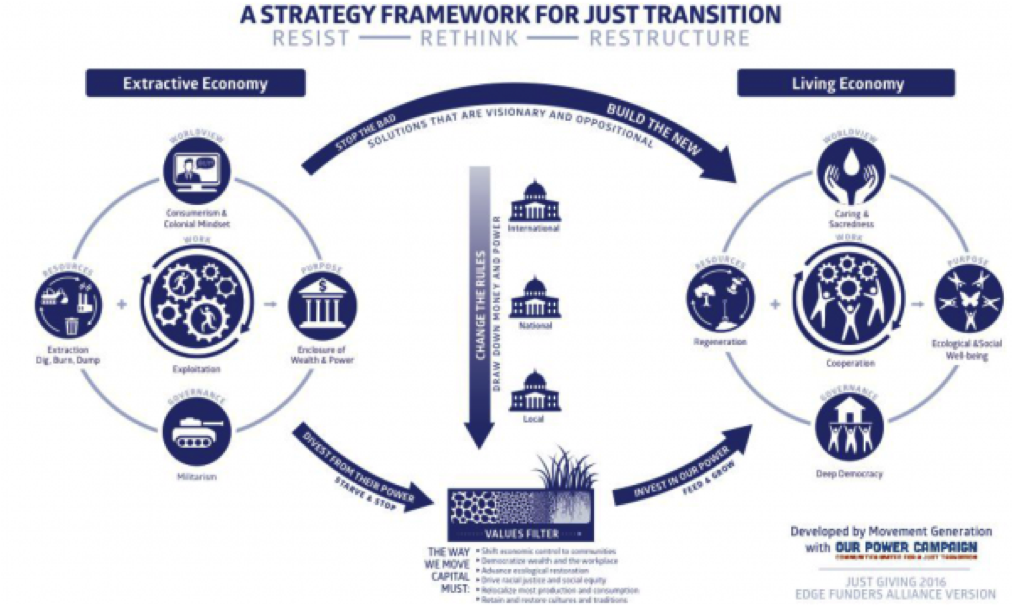To truly hope, we must be able to articulate clearly and compellingly what it is that we’re hoping for. One of the most rebellious things that we can do is to articulate our own, radical vision, to organize around that vision, and to build real alternatives that embody it in our daily lives. – Farhad Ibrahimi
Imagine a world where progress is not only measured by the market value of all final goods and services produced in a year (GDP) but by the quality of your human relationships, by the resilience of our communities and by the health of forests and rivers.
As Trump, Erdogan and Putin appear more frequently in the media, people start to wonder: is the world really that bad? Is there something fundamentally wrong with the world if these are our elected leaders? We seem to be living in a discouraging Zeitgeist that is fundamentally at odds with the vision of humanity described in the first sentence and indeed what capitalism had promised us – or what we believed it would bring. The enlightenment project seems to have stalled and put in reverse gear towards nationalism, xenophobia and bigotry and its scary as hell.
My personal experience with wealth owners has been a frequent ‘head-in-the-sand syndrome’; many deny that there is a fundamental problem with the world, the economy, politics, the system. Yet the truth is that – despite our immense technological advancements – society today is following a neofeudal model, where very few people hold most of the power, and control how the game is played. It has arguably always been like that some might say, while others feel comfortable with this.

The question is, does the majority of society really want things to continue this way? For example, why should we allow wealthy individuals and corporations to fund politicians, thereby paving the way for favours they will later collect a la Sicilian mafia? Why should the rich not be taxed at least the same as everybody else? How many Panama or Paradise Papers do we need before real reform? The uncomfortable truth of our times is that the system that has brought us to this point cannot continue with business as usual because we will face massive disruptions. It is clear that we need systems change, which has been defined as:
fundamentally, and on a large scale, change the way a majority of relevant players solve a big social challenge, such that a critical mass of people affected by that problem substantially benefit.

As a person of wealth you can choose to sit idly by in your comfortable cocoon, while the rest of humanity is fighting those battles. You can focus on only satisfying your own immediate needs and in the worst case you will be transferred to a gated community with your loved ones when social conflict gets too intense in your country (as is already the case in South Africa). But maybe by being a bystander and not using the resources you have at your disposal to intervene, you are massively guilty of inaction? Food for moral thought..
This article is about those that want to take action and be part of the solution.
Commonly, from what I have seen, the avenues that wealthy individuals opt for traditional philanthropy and impact investing. Impact Investments are investments that combine a financial return with positive social and ecological impact. These investments often offer the same risk-return profile as conventional investments. Hence you can change the way you invest today and achieve the same, if not better, returns than conventional investments (anyone reading this who has the assets, please do so!)*.
There are fantastic communities such as The ImPact and Toniic focused on this part of the equation. I salute their work. But we have to go a step further.
Traditional philanthropy focuses on alleviating the symptoms of a problem, for example funding homeless shelters or giving out Malaria prevention-nets in Sub-Saharan Africa. These are all justifiable causes and I do not want to deride them. However, I want to make the case that the highway to human progress is becoming a progressive philanthropist.
So what does being a progressive philanthropist mean for me?
Progressive philanthropists think strategically about how they can have the maximum impact. As a person of wealth, you should strive to pull all the levers you have, which are mainly your:
A) Investment capital (via impact investments)
B) Philanthropic capital (via funding activists and social movements)
C) Career choice(s) and how you spend your time (e.g. systems-change oriented work)
D) Contacts and connections (e.g. lobbying politicians, getting more wealth owners engaged for good causes)
In the investment world, the discourse is shifting more and more towards investments that integrate social and ecological concerns. Pension funds are divesting from fossil fuel companies all over the world. This is great, and you should not waste any time in doing the same.
In the philanthropic world, we still seem obsessed over treating symptoms rather than trying to change our broken systems. What is urgently needed are more funders that are willing to support activists and social movements that are working towards changing our system towards one that is prioritising social and ecological wellbeing, the Commons Movement, the Buen Vivir Movement, the New Municipalism movement – take your pick. A framework that has come up with defining how this change should take place is called the Just Transition, which we have described more extensively in this blog post.

For your (progressive) philanthropic journey, I would encourage you to do the following:
1)Read about systems change philanthropy. A great place to start is this article by Leah Hunt-Hendrix of Solidaire and/or this article by Farhad
Ibrahimi of the Chorus Foundation. Of course feel free to follow our
Guerrilla Foundation blog as well!
2)Be aware that the only thing that will change the world we live in, profoundly and in a lasting manner, are social movements. Just think back to Martin Luther King Jr. and Gandhi when in doubt.
3)Find role models and mentors such as the Chorus Foundation, Solidaire and the Bewegungsstiftung in Germany. The EDGE Funders Alliance, a network of progressive foundations, will also be able to help you in finding the right mentors.
4)Get your “hands dirty” and connect with your local activists. Start making small donations and build trust with activist groups.
5)Enjoy the ride and bring your friends and family along. We need more people of wealth to step up their philanthropic giving in a major way.
Now if you are reading all this and vigorously nodding your head, please reach out to us (hell, even if you’re mildly rotating your skull back and forth reach out). We at the Guerrilla Foundation are passionate about finding and supporting people from wealth that want to change the world. Ideally, we would like to build a network of progressive philanthropists in Europe, something we are planning together with a couple of other young people of wealth and the EDGE Funders Alliance (for more information see this open call). Again, if you are interested in learning more about our work and this planned network, please feel free to reach out us. Changing the world is more fun and effective done in company.
*For more information, please see this meta-study of more than 2,000 empirical studies of the relation between environmental, social, and governance (ESG) criteria and corporate financial performance (CFP). For examples of impact investing portfolios, you can visit the website of the Bewegungsstiftung, KL Felicitas Foundation, Blue Haven initiative and RS Group to see how money can be invested for sustainable development.



